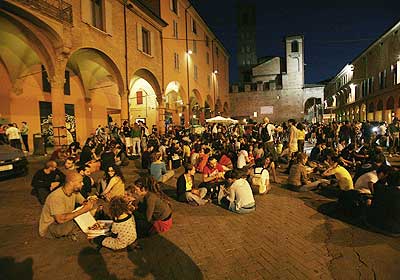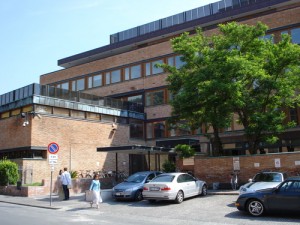No study abroad experience would be complete without studying at some degree of foreign university. In the case of Bologna, Italy, the city’s university offers a mind-boggling number of courses to its nearly 100,000 students from the undergraduate through the postgraduate level. However, the unique nature of Dickinson in Bologna offers a different option for some students.
One of Johns Hopkins University’s graduate schools in foreign affairs happens to be located right along Via Belmeloro (that’s Belmeloro Street folks) in the heart of the city. The students have tremendously diverse backgrounds (including history) and come from all over the world. There are even professionals that enroll in, and audit courses. Dickinson is the only undergraduate institution in the city that is allowed to enroll students in its graduate-level classes.
But wait a minute, what does this have to do with history? Well, a largely political science-based grad school is an interesting (and trying) experience for any history major. In my case, I am enrolled in a class titled “Alliances and International Relations,” taught by the esteemed Professor Marco Cesa (every time I mention his name eyes light up around the room). No, it’s not an outright history class, but it uses case studies and historical precedent to understand the nature of alliances and how they apply to international relations theory (cool, right?). Here’s the kicker: most of what we learn as undergraduate history majors teaches us to discover a historian’s thesis, agree or disagree and respond in kind. When we read an article for Hopkins, it’s assumed that you know what the scholar is arguing. It becomes your job to tear apart his (or her) argument, point out its flaws and essentially introduce your own theory. Just to make things even better, it’s political science (and IR theory, to boot). Translation: the way one has to think about the substance of the course is completely different from history. Everything is very mathematical and tightly bound to certain schools of thought. If you’re talking about how state actors interact in multipolar power systems, you’d better be thinking like a realist or an idealist, because there is no middle ground. Thinking like a historian, while limiting at certain times, allows a scholar to transcend much of the “jargony,” broad-based theories of political science and often develop a more thorough understanding of something’s nature.
What I’m trying to say about all this is that, as a history major, I feel I am broadening my ability to think about what I am reading. While courses like History 304 highly encourage criticism and reasoning about scholarly work (thank you Professor Pinsker), grad school forces one to take the next critical step in academia, and openly say someone with several more degrees and a lot more books published than you is simply wrong. It really makes this idea set in: if political science can be radically flawed, what in the world can be said for history. Put your thinking caps on Dickinson, it’s a big, scary and bad-scholarly-article-filled world out there.
[If at any point this came across as implying that we don’t think enough in the history department, that is not the intention. Quite the contrary. I think that I was by far the best prepared Dickinson student at Hopkins because of my methodological work in Carlisle.]


